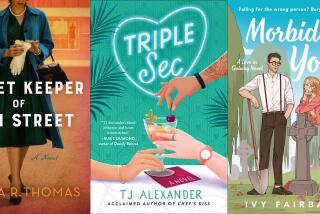Searching for the light
- Share via
Russell BOYD, a south Vermont state trooper with a heightened sense of life’s potential for disaster, and Frank Kohler, a computer repairman with dreadful memories and a bleak-seeming future, are the apposite protagonists in Craig Nova’s riveting, finely rendered, insight-provoking novel: Two somewhat similar yet crucially different cruisers along life’s two-lane blacktop are unwittingly bound for a head-on collision.
Or almost unwittingly. Boyd, warned as a boy by his World War II-veteran grandfather of “the essential horror” that can happen “when things come unglued,” sometimes broods “that his entire life was dedicated to finding the person he was most afraid of.” Kohler, haunted by the childhood loss of his murdered mother, gropes clumsily toward some yearned-for moment of “golden heat and super brilliance,” through which he imagines he’ll “emerge from the shadows he had lived in for years.”
In alternating chapters, the reader views life from Kohler’s point of view and from Boyd’s: an optical-spiritual illusion in which the glass is now half-empty, now half-full. For Kohler, who carries the atmosphere of his awful childhood with him “like his own private genie that just wouldn’t go back into the bottle,” the world in its springtime splendor is reptilian: “Everything was a lizardlike green, and the hillside opposite the field below his house resembled an enormous alligator.” But Boyd, despite his awareness of omnipresent dangers, is “struck by the beauty of the ordinary” -- a day-to-day mixture of “the unbelievably mundane and the profound and mysterious.”
Let it quickly be said that “Cruisers,” though rich in symbols and glittering with images, is a tense and fast-paced chronicle, told in prose as nimble and shiny as a pellet of mercury. Boyd is, after all, a policeman, and “Cruisers” is, among other things, an oblique police-procedural novel, in which trooper Boyd from time to time seeks clues to a roadside killing “like a blind man ... who kept going around a room with no door.” In the effective way the author mixes vivid prose, existential riddles and violent incident, Nova bears comparison to such contemporaries as Robert Stone, Pete Dexter, Thomas Berger and Jim Harrison. But such shorthand comparisons don’t do justice to Nova, whose 10 previous novels include “The Good Son” and “Wetware,” and whose growing body of work puts him in a category all his own.
“Cruisers” is of special interest in the perceptions it prompts and the questions its characters’ actions beg. In the balanced scheme of this gritty text, those who render violence have it returned upon them; those to whom violence is done pass it on. Is there no way out of such vicious cycles? Is free will trumped by fate?
Frank Kohler fumbles for redemption but seems to reject or spoil the chances he’s given. Russell Boyd encounters daunting obstacles too -- but he keeps trying to push ahead into light. (“Maybe believing isn’t what I’m talking about. Maybe it’s more like hope.”) All suffer pain, sadness, anger, but not all succumb to “the sudden, nameless gloom ... that beguiled and injured ... as though the future had been banished by vanity and ill will.”
Wonderful too are the heartbreaking ways in which emotions overlap: how Kohler clings to the ache of his mother’s absence “since if it was gone, it would be like losing his last real memory of her.” With a poet’s sensitivity, Nova renders nuances of mood, complexities of character. “Cruisers” is like a poem, at once hard-boiled and lyrical -- a poem of and for our time. *
More to Read
Sign up for our Book Club newsletter
Get the latest news, events and more from the Los Angeles Times Book Club, and help us get L.A. reading and talking.
You may occasionally receive promotional content from the Los Angeles Times.









